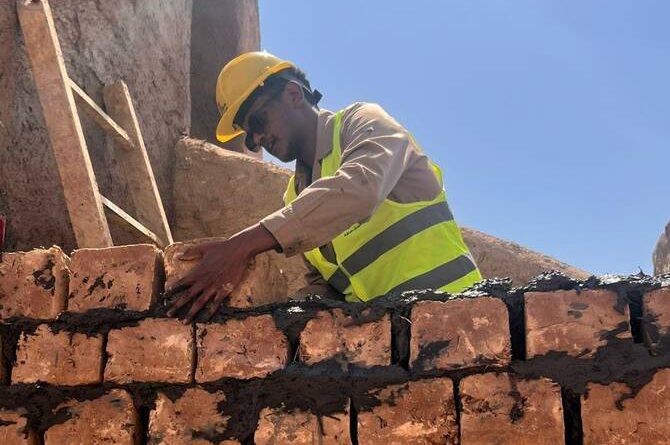Saudi Students Gain Hands-On Experience in Restoring Historic Mosques Through National Heritage Program
Riyadh – Saudi Arabia’s Mohammed bin Salman Project for the Development of Historical Mosques continues to make remarkable progress in preserving the Kingdom’s architectural heritage while empowering the next generation of Saudi youth.
In partnership with the Heritage Commission and the Royal Institute of Traditional Arts, the program has provided an opportunity for 15 Saudi students to actively participate in the restoration of historic mosques across the country.
This initiative not only safeguards valuable heritage sites but also equips young Saudis with traditional craftsmanship skills that are vital to maintaining the nation’s cultural legacy.
The students are taking part in a six-month field training program designed to teach traditional mud-brick construction and woodworking techniques under the guidance of specialized Saudi engineers and restoration experts.
Their hands-on involvement ensures that heritage preservation becomes a living educational experience, connecting students directly with their country’s deep architectural traditions.
Another 15 students are set to join the program in the coming days, extending the training into early 2026, further enriching the pool of skilled artisans capable of contributing to heritage conservation.
The program is organized into two key training tracks. The first focuses on traditional construction methods, allowing students to learn the craft of mud-brick building—a technique used for centuries in Saudi architecture.
Through practical modules, trainees gain experience restoring historic mosques using authentic materials, ensuring that the renovations remain faithful to original designs.
Each project is carried out under expert supervision, guaranteeing both historical accuracy and structural integrity.
The second training track centers on the art of crafting traditional Najdi doors, an important element of Saudi architectural identity.
Students are trained in carpentry, carving, and wood production techniques that have been passed down through generations.
This component of the program aims to preserve and revive the craftsmanship that defines Najdi-style architecture, ensuring that this ancient art continues to flourish in modern times.
The Mohammed bin Salman Project for the Development of Historical Mosques has already achieved impressive milestones. During its first phase, 30 mosques were restored across 10 regions, and in the second phase, another 30 mosques were completed in 13 additional regions.
Each restoration reflects the project’s dedication to preserving authenticity while incorporating modern sustainability practices. By reviving historic mosques, the initiative breathes new life into communities and creates spaces where history, faith, and culture coexist harmoniously.
The project’s overarching vision is to revive traditional architectural styles, raise public awareness of their cultural significance, and balance heritage preservation with contemporary building standards.
These efforts align closely with Saudi Arabia’s Vision 2030, which emphasizes cultural sustainability, national identity, and the integration of heritage into modern life.
The initiative underscores the Kingdom’s commitment to preserving its architectural authenticity while ensuring that restored mosques remain functional for worship and community gatherings.
Guided by four main objectives, the project aims to prepare historical mosques for worship, restore their original architectural character, highlight Saudi Arabia’s rich cultural heritage, and enhance the Kingdom’s religious and cultural stature globally.
These goals reflect the Kingdom’s broader dedication to showcasing the beauty of its historical identity while promoting education, craftsmanship, and innovation among its citizens.
The involvement of Saudi students adds an inspiring educational dimension to the program. It transforms heritage conservation into an interactive learning process that connects young people to their history, fosters national pride, and encourages them to carry forward traditional building knowledge.
This hands-on experience also supports the Kingdom’s strategy of developing local talent capable of leading future restoration and sustainability projects.
Through initiatives like this, Saudi Arabia continues to demonstrate how heritage preservation can go hand in hand with youth empowerment, cultural innovation, and sustainable development.
The Mohammed bin Salman Project for the Development of Historical Mosques stands as a model of how nations can protect their historical treasures while building skills and opportunities for future generations.



